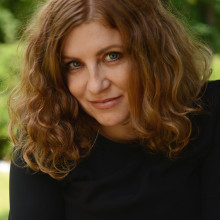Polish literature

Wioletta Grzegorzewska
[Wioletta Greg] was born in 1974 in Koziegłowy. She is a poet, a prose writer, and a translator of English literature. She graduated in Polish Literature from the Pedagogical Academy in Częstochowa (presently the Jan Długosz Academy). In 2003–2005 she and her husband edited Bulion magazine and ran a publishing house of the same name. Her work has appeared in The Guardian, Words Without Borders, Fraza, Kresy, Tygiel Kultury, and Zeszyty Literackie.
Wioletta Grzegorzewska’s writing is overtly autobiographical – real situations, places, and figures often form the backbone of her prose and poetry. We see this in the poetry volume Orinoko (2003), whose overriding motif is events from her time as a student. The prose extension of this poetry is a novel published in 2017, titled Chambers, an extract from the life of a young girl from a village outside of Częstochowa, who travels to the big city to study. The turning points in this tale are in the consecutive rooms she occupies. This “coming-of-age diary” (the protagonist has the soul of a child, but a growing sense of femininity) takes place over the course of the 1990s with its cultural transformations, accompanying a period when new structures were forming in Poland. Grzegorzewska put the earlier sequences of the life of the girl (named Wiola, which unambiguously identifies her with the author) in Swallowing Mercury (2014), a novel that won the Nike and Gdynia awards, taking the form of short stories bound by the figure of the main character. The peak years of communist Poland that Wiola was born into and which formed the backdrop for her childhood are neither demonized nor glorified by Grzegorzewska. This is just one reality, which has both its negative and positive sides. The author described characteristic facets of this reality in the poetry contained in Brownian Motion (2011). Courtyard gossip, newspaper articles, and information from the television form this image of a gray everyday world, spiced up with more or less authentic scandals. The second part of the volume is an epic piece, a monologue of impressions spoken by a person living in a monastery (here, too, we find autobiographical strains).
Language plays a special role in Wioletta Grzegorzewska’s work. The subtle insertion of colloquial words in the poetic prose keeps the protagonist tied to the world where she was born and raised. This somewhat magical space of the Polish communist village, filled with superstitions, beliefs, and myths, is indelibly pressed in her soul, as the girl knows all too well. It does not create dilemmas, however; it equips the protagonist with a special sensitivity for observing people and the world.
In the poetry collection Links (2003), the author evoked people with whom she had not only family bonds, but local and cultural ones as well. This volume has a remarkably vivid vision of a powerful and sensitive femininity, personified by women from the pages of history.
Grzegorzewska’s work is mature and introspective writing based on personal memories, set in times of political and cultural turmoil; these times were important for herself and for the nation as a whole.
Katarzyna Wójcik
BIBLIOGRAPHY
Poetry:
- Wyobraźnia kontrolowana, wyd. WSP, Częstochowa 1997,
- Parantele, wyd. Bulion, Częstochowa 2003,
- Orinoko, Biblioteka Tyskiej Zimy Poetyckiej, Tychy 2008,
- Inne obroty, Polski Fundusz Wydawniczy w Kanadzie, Stowarzyszenie Literacko-Artystyczne „Fraza”, Toronto-Rzeszów 2010,
- Ruchy Browna, Towarzystwo Literackie „Li-TWA”, Częstochowa 2011,
- Pamięć Smieny/Smena’s Memory, OFF Press, Londyn, 2011,
- Finite Formulae and Theories of Chance, przeł. Marek Kazmierski, Arc Publications, Todmorden 2014,
- Czasy zespolone. Wybór wierszy, Kraków, Wydawnictwo Eperons-Ostrogi.
Prose:
- Notatnik z wyspy, wyd. e-media, Częstochowa 2012,
- Guguły, wyd. Czarne, Wołowiec 2014,
- Stancje, wydawnictwo W.A.B., Warszawa 2017.
TRANSLATIONS:
Catalan:
- Mercuri a la boca [Guguły], transl. Xavier Farré, Barcelona: Rata, 2017.
English:
- Finite formulae & theories of chance, transl. Marek Kaźmierski, Todmorden: Arc Publications, 2014.
- Pamięć Smieny = Smena's memory, transl. Marek Kaźmierski, London: OFF Press, 2011.
- Swallowing Mercury [Guguły], transl. Eliza Marciniak, Oakland, CA: Transit Books, 2017.
- Accommodations [Stancje], transl. Jennifer Croft, Oakland, CA: Transit Books, 2019.
French:
- Les Fruits encore verts [Guguły], transl. Nathalie Le Marchand, Paris: Editions Intervalles, 2018.
German:
- Unreife Früchte [Guguły], transl. Renate Schmidgall, München: C.H. Beck, 2018.
- Die Untermieterin [Stancje], transl. Renate Schmidgall, München: C.H. Beck, 2019.
Italian:
- Un frutto acerbo [Guguły], transl. Barbara Delfino, Milano: Bompiani, 2020.
Korean:
- Sueun eul masida [Guguły], transl. Eunji Gim, Incheon: IWbook: Sangsang ui Nalgae, 2018.
Spanish:
- Tragar mercurio [Guguły], transl. Karolina Todorowa, Barcelona: Rata, 2017.